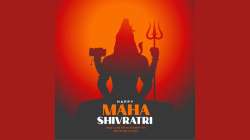Maha Shivratri 2023 fasting instructions: Dos and Don'ts to remember when worshiping Lord Shiva
Mahashivratri, the annual festival honoring Lord Shiva, is being celebrated on February 18, 2023, across India. Devotees visit temples, perform rituals, and follow specific guidelines for fasting, including consuming satvik food items and avoiding certain foods and practices.

Maha Shivratri, a significant festival devoted to Lord Shiva, is celebrated annually in the month of Magha according to the South Indian calendar and Phalguna based on the North Indian calendar. Unlike the monthly Shivratri, Mahashivratri is commemorated only once a year, to honor the night when Lord Shiva performs his Tandava Nritya. According to another myth, the day celebrates the night of Lord Shiva's marriage to Parvati. This year, Mahashivratri is being observed on February 18, 2023, across the country.
Mahashivratri is a celebrated festival in various states from Uttarakhand, Rajasthan, Uttar Pradesh, Madhya Pradesh, Punjab, Himachal Pradesh, Bihar to Karnataka, Tamil Nadu, Andhra Pradesh, or Telangana. Devotees visit Shiva temples, perform Shiv Archana, and offer milk, dhatura bel patra, sandalwood paste, ghee, sugar, and other bhog items to the Shivling. The devotees observe a fast throughout the day and break it the next morning.
The Mahashivratri Puja is conducted during the night.
While fasting, devotees can consume satvik food items such as buckwheat, ragi, sabudana, fruits, and certain vegetables. Those who observe the fast should follow the following Dos and Don'ts.
Mahashivratri fasting Dos:
- Take the sankalp for Mahashivratri fasting the day before the vrat after taking a bath in the morning and while doing Shiv Puja. Place some rice and water in the palm while taking the sankalp.
- On the day of fast, wake up early in the morning.
- Take a bath on the day of the fast and wear clean clothes, preferably white.
- Recite 'Om Namah Shivay' several times throughout the day.
- Take a second bath in the evening before doing Shiv Puja since the Shivratri Puja is conducted during the night. Devotees usually break the fast next day after taking a bath.
- People who are suffering from specific health conditions or are on medication should consult their doctor before going ahead with the fasting.
- Milk, dhatura flower, belpatra, sandalwood paste, yogurt, honey, ghee, and sugar can be offered to Lord Shiva.
- Break the fast between sunrise and before the end of Chaturdashi Tithi to receive the maximum benefit of the Vrat, according to Drikpanchang.
Mahashivratri fasting Don'ts:
- Do not consume food made of rice, wheat, or pulses during the fast.
- Strictly avoid non-vegetarian food, garlic, and onion as these items are tamsik in nature.
- Do not offer coconut water to Shivling.
- Mahashivratri is a significant religious festival and widely celebrated across India. Following the above Dos and Don'ts can help you observe the Mahashivratri fast in the right way.
What are the customs and traditions associated with Mahashivratri?
The devotees of Lord Shiva visit Shiva temples, perform Shiv Archana, and offer milk, dhatura bel patra, sandalwood paste, ghee, sugar, and other bhog items to the Shivling. People fast throughout the day and break it the next morning.
